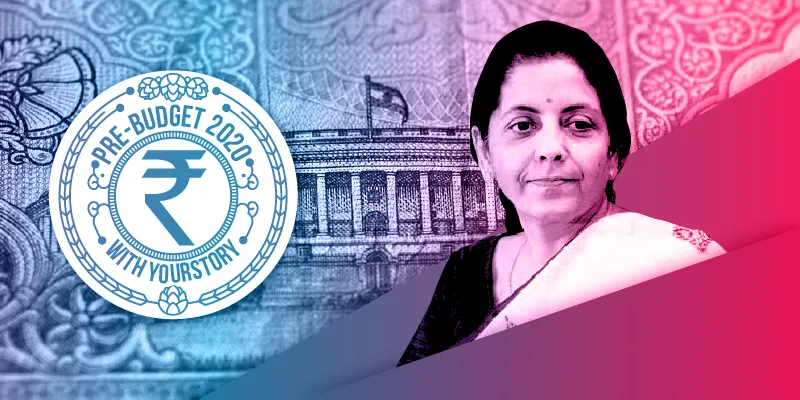Budget 2020: startups hope FM will boost growth with tax reforms, improve ease of doing business
This will be a crucial Budget for the Indian economy as it comes at a time when India is trying to get its growth back on track
The Union Budget has always been a much-anticipated event. But this year, there is heightened interest as there are strong headwinds faced by the country with depressed consumer sentiment and lower tax collections.
It remains to be seen how Union Finance Minister Nirmala Sitharaman, who will be presenting her second Budget since her appointment to the government last year, will steer the economy to a growth path.
The Economic Survey, which was tabled in the Parliament on Friday, has projected an economic growth of 6-6.5 percent for the upcoming financial year, and this seems like a modest target, given the country aims to become a $5 trillion economy by 2024.

The government has unveiled the vision of ‘Digital India’ and ‘Startup India’, which is expected to transform the country into a digitally empowered society, while also lifting the prospects of other crucial cogs of the economy – agriculture and manufacturing.
However, the backdrop to Budget preparation has not been really positive with tax collections not meeting the target, fall in consumption and investment activity, and rising inflation. But the critical element is drop in consumer consumption, which is a key driver of the economy. Lastly, the fear is that economy may see a higher fiscal deficit, which is likely to have negative consequences.
The task of the finance minister in the Union Budget 2020 will be to unleash the entrepreneurial fervor, open the gates of funding or investment further, and improve the environment on the ease of doing business in the country.
Boosting consumer sentiment
The key for this year’s Union Budget will be to lift the consumer spending sentiment - whether it is in the form of lowering of income tax or reducing the rates on various goods of consumption. This will have an all-round impact on the economy, and more so for new-age sectors like fintech and ecommerce.
The fintech segment is hoping that the Union Budget will usher in new measures, which will create an environment for banks to increase their lending funnel, and given the digital infrastructure in the country for finance in the form of UPI, it should act as a morale booster.
Ankush Aggarwal, Founder, Avail Finance, a fintech startup, says, “Fintech industry is playing an important role in the penetration of financial services with digitalisation being the priority agenda for the government to enable financial empowerment across the country. We expect the Union Budget 2020 to introduce measures to ease working capital blockages, introduction of better products, and higher penetration of credit to reach a wider ecosystem in 2020.”
It is a similar scenario for the ecommerce industry in India where the Union Budget is unlikely to talk about the policy aspects, but it can provide the booster shot in terms of improving the purchasing power of the consumers.
Despite the tussle between the ecommerce companies and the offline merchants, the key will be to put more money into the hands of the consumers, which will help both the segments.
Siddharth Jain, Co-founder, Vaahika, says, “Indian economy needs an urgent dose of consumption booster. Thus it will be wonderful to have provisions in the Budget, which could assist in an instant rise in consumer expenditures.”
Investment flow
The startup ecosystem has come under the spotlight of the ruling government, and has called for measures which can enhance its vibrancy and further strengthen its base.
The Indian Software Product Industry Round Table (iSPIRT) has called for numerous measures which will allow for further capital inflow into the startup ecosystem along with encouraging participation from domestic investors.
However, the key for the Budget will be to remove some of the cobwebs in the form of lopsided taxation structure on ESOPs and the niggling issues around Angel Tax.
As startups start getting integrated with the mainstream economy, they are already starting to feel the pinch of Goods and Services Tax (GST). There are already certain provisions in the GST which has blocked the working capital of startups, and this may require an urgent remedy.
The present government has a big thrust on creating a cleaner environment so there is a strong focus on the electric vehicles (EVs) segment. It has already spoken about creating a nation-wide charging infrastructure, which will popularise the use of EVs.
Electric Vehicles
The government has made an outlay of Rs 10,000 crore over the next three years to incentivise the purchase of electric vehicles. Tax benefits have also been announced to promote the manufacturing and purchase of electric vehicles.
“The revival of the automobile industry is expected to be on the priority list in the upcoming Budget session. Low market sentiment and the transition to BS VI emission standards were said to be the prime reasons for the industry’s slowdown last year. The government must boost consumption,” says Jeetender Sharma, Founder and MD, Okinawa Autotech.
He further feels that EV revolution has certainly picked up well in India with subsidies and incentives being provided by the government.
“However, the cost of components and import duty remains a big concern for EV manufacturers. Certain parts of products are still imported due to lack of manufacturing facilities, and this forms a major part of the overall product cost,” he says.
The Union Budget can set new benchmarks for the Indian economy as a whole, and startups in particular, with measures which can rev up the engines of growth.
(Edited by Megha Reddy)










